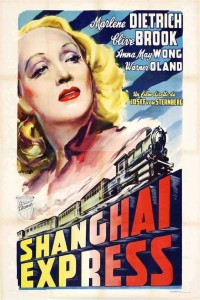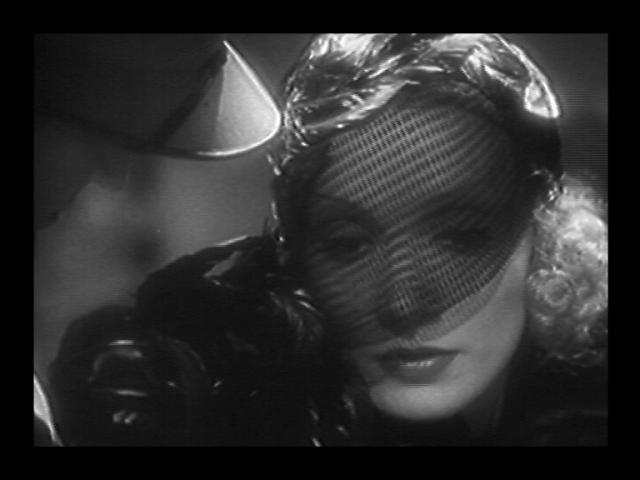“When I needed your faith, you withheld it; and now, when I don’t need it, and don’t deserve it, you give it to me.”
|

Synopsis:
A notorious prostitute named Shanghai Lily (Marlene Dietrich) runs into her former flame (Clive Brook) while traveling on a train from Peking to Shanghai. When a revolutionary (Warner Oland) and his men commandeer the train and hold Owen hostage, Dietrich realizes she can intervene to save his life — but will this be enough to win back his love?
|
|
Genres, Themes, Actors, and Directors:
- China
- Clive Brook Films
- Hostages
- Josef Von Sternberg Films
- Marlene Dietrich Films
- Prostitutes and Gigolos
- Revolutionaries
- Strong Females
Response to Peary’s Review:
Peary refers to this von Sternberg-Dietrich collaboration (their fourth together) as an “absurd but delectable bit of pulp perversity” full of “sin, sadism and sex” — yet despite its risque themes, the story itself remains oddly forgettable. The primary problem is that we never quite believe someone like Shanghai Lily would fall for someone like Clive Brook (!), whose romantic allure leaves much to be desired; their romantic dilemma (unlike, say, that of star-crossed lovers Rick and Ilsa in Casablanca) never strikes one as particularly convincing or compelling. Peary astutely notes that “like other Dietrich women” (such as Lola Lola in The Blue Angel), Lily “doesn’t even attempt to defend her actions — if [Owen] doesn’t have faith in her, that’s his problem” — yet neither Dietrich’s character, nor that of beautiful Anna May Wong as her sultry companion, are fleshed out enough for us to become invested in their intriguing dilemma as “fallen” women in a male-dominated world. What lingers longest in one’s memory about Shanghai Express (note the clever double-entendre title) is Lee Garmes’ Oscar-winning “superb cinematography”, which includes several breathtaking “close-ups of Dietrich, particularly when she’s smoking against the door in the train.”
P.S. Peary nominates Dietrich’s performance for an Alternate Oscar as best actress of the year.
Redeeming Qualities and Moments:
- Lee Garmes’ Oscar-winning cinematography

Must See?
Yes, simply as one of von Sternberg’s most beloved films (though I’m not a fan).
Categories
- Important Director
- Oscar Winner or Nominee
(Listed in 1001 Movies You Must See Before You Die)
Links:
|


One thought on “Shanghai Express (1932)”
Oddly, in spite of its terrific cinematography and its somewhat iconic status (thanks largely to Dietrich’s presence; mostly meaning the way she’s photographed), I wouldn’t call this a must.
Those who read Peary’s statements of the film being absurd, perverse or full of “sin, sadism and sex”, and therefore look forward to all that may more than just imply, are bound to be set-up for disappointment. Really – how ‘perverse’ could a 1932 film from a major studio like Paramount be?
‘SE’ is actually rather simple, straightforward and tame. Its exotic surface may have wowed audiences in its day (and stretched the limits of cinema at the time) but, watching it now, there’s something very cold, removed, and even lethargic about it. Most of the time, everyone in the film seems so jaded it’s a wonder they can make the effort to move.
Better dialogue may have helped. At least more zingers like~
Oland: (to Dietrich, who has just tried to shoot him) You only had my interest before. Now you have my admiration. I could love a woman like you.
Don’t get me wrong: I normally love films of this type – and the von Sternberg/Dietrich collaboration was, at times, a potent one. But this one, to me, seems of the form-over-content variety. It’s not unwatchable – no doubt, the average ff will see it anyway – but I feel sluggish watching it. Its admirable premise of the importance of faith between lovers notwithstanding, I don’t feel much involving energy here. That doesn’t say “must see” to me.